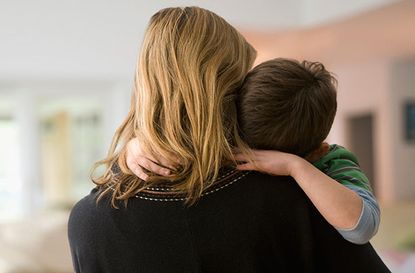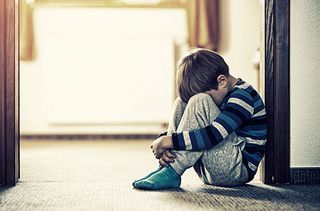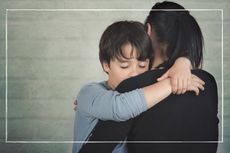How to explain acts of terrorism to your child
How to help them make sense of acts of war and terror


When the world feels like a confusing and often scary place to adults, it's hard to even contemplate how overwhelming it can be for a child.
With tragedies like the terrifying explosion at Ariana Grande's Manchester concert and the recent Westminster Bridge attack dominating the headlines on what appears to be a daily basis, it's unsurprising that many children feel nervous about growing up, and going about their lives.
'Many children feel upset for a few weeks after a frightening event,' explains clinical child psychologist at the Anna Freud National Centre for Children and Families David Trickey, who wrote a blog on the subject for the Huffington Post.
They may show this in a number of ways - David cites nightmares, getting angry and upset easily, lack of concentration, problem at school and loss of sleep as just some potential reactions, but adds that: 'over time, most become happier and more confident again.'
'However, some children will continue to have problems several weeks after the event. If you are worried because a child or young person is very distressed, or continues to be distressed after a month or so, you could seek help from your GP. They can check your child's health and talk to you about who else could help.'

David advises against glossing over the stories completely, adding: 'Children and young people need a truthful, age-appropriate explanation that makes sense of the main facts. Even younger children can benefit from being given a description and explanation of what happened.'
'Talking is often helpful, but needs to be done carefully and sensitively at the right time for the child or young person. Try and provide opportunities, support and encouragement to help them talk about it when they are ready to, rather than forcing them. Some children and young people may want to use toys or draw pictures to help them understand what has happened.'
GoodtoKnow Newsletter
Parenting advice, hot topics, best buys and family finance tips delivered straight to your inbox.
A spokesperson for the NSPCC agreed that talking to children about world events is key to helping them cope with them: 'We know children and young people can become anxious and distressed by disturbing events in the wider world and can often find it hard to make sense of politics, natural disasters and events like terrorist attacks.' 'We need to ensure our children are reassured rather than left overwhelmed and frightened, and the best way to help those that are struggling is for them to always have a trusted adult to talk to, be it a parent, teacher or someone from Childline.'
The charity has also published advice to help support children with worries about the world:
- Listen carefully to a child's fears and worries
- Offer reassurance and comfort and avoid complicated and worrying explanations that could leave them more frightened and confused
- Help them find advice and support to understand distressing events and feelings
- Children can always contact Childline free and confidentially 24/7
Trusted, informative, and empathetic – GoodToKnow is the ultimate online destination for mums. Established in 2007, our 15-year-strong archive of content includes more than 18,000 articles, 1,500 how-to videos, and 7,000 recipes.
-
 I tested the Lakeland Dual Basket air fryer and it made midweek family cooking a breeze
I tested the Lakeland Dual Basket air fryer and it made midweek family cooking a breezeYou can’t go wrong with the dual basket air fryer by Lakeland complete with easy-view windows to ensure burnt food is a thing of the past…
By Jessica Dady Published
-
 Reframing one simple habit could get your sex life back on track after having a baby, new research shows
Reframing one simple habit could get your sex life back on track after having a baby, new research showsMany parents struggle to get their sex life back on track after having a baby, but new research has shown how one simple habit could make all the difference.
By Ellie Hutchings Published
-
 Talking about school shootings with your kids - tips from the experts
Talking about school shootings with your kids - tips from the expertsBy Stephanie Lowe Last updated
-
 How to talk to kids about coming out as gay, lesbian or bisexual: 6 expert tips for a supportive and empowering conversation
How to talk to kids about coming out as gay, lesbian or bisexual: 6 expert tips for a supportive and empowering conversationKnowing how to talk to kids about coming out as gay, lesbian or bisexual is important. These are The Proud Trust's top tips to get started.
By Grace Walsh Last updated
-
 How to talk to children about war, according to a child psychologist
How to talk to children about war, according to a child psychologistBy Stephanie Lowe Last updated
-
 Talking about periods with kids: 7 top tips with advice from the experts
Talking about periods with kids: 7 top tips with advice from the expertsBy Grace Walsh Last updated
-
 How to spot the signs of bullying and help your child if they are being bullied
How to spot the signs of bullying and help your child if they are being bulliedFinding out your son or daughter is the target of bullying is never nice, but what can you actually do to help?
By Sibelle Mehmet Last updated
-
 How to talk to your child about sex - with tips from an relationships expert and books to help you out
How to talk to your child about sex - with tips from an relationships expert and books to help you outDoes your child have questions about the birds and the bees? Here's how to start talking about sex with your children, with expert advice to help you out.
By Grace Walsh Last updated
-
 What is autism? Everything you need to know about the spectrum disorder
What is autism? Everything you need to know about the spectrum disorderA helpful guide for parents
By Amy Hunt Last updated
-
 Helping your child to grieve
Helping your child to grieveWhether it's a parent, a grandparent or a beloved pet, here's what to do if the worst should happen
By GoodtoKnow Last updated